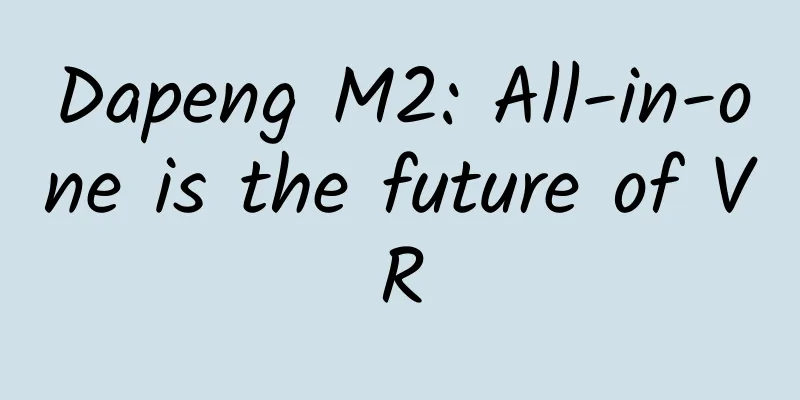Dapeng M2: All-in-one is the future of VR

|
Oculus founder Palmer Luckey once made it clear that the future of virtual reality belongs to mobile headsets. At present, VR headsets on the market are mainly divided into two categories: one is the head-mounted devices based on PC or host platforms, represented by Oculus, HTC VIVE, and PSVR; the other is what Palmer calls mobile headsets. The latter can also be subdivided into box-type products that need to be used with smartphones and "all-in-one machines" with built-in computing functions. In the past year, at VR conferences or forums of all sizes, more than one VR practitioner has put forward the view that all-in-one machines are the future of VR headsets, and Lexiang Technology CEO Chen Chaoyang is one of them. On March 24, Lexiang Technology released its first all-in-one VR machine, Dapeng M2, which can be regarded as Dapeng's most powerful practice of this view. The release of Dapeng M2 can also be seen as a bet that Lexiang has placed on the development trend of VR. Whether this bet can be successful, we may start with the following two questions. 1. Why is all-in-one device the future of VR? Let's start with Oculus. Palmer, who started out as a PC VR headset developer, once complained that cables will be a major obstacle for the VR industry for a long time, because players have to spend a lot of time sorting out wires before starting the VR experience. Getting rid of the trouble of wires may be the first major advantage of mobile VR. Keywords such as movable, flexible, and portable also come with it. In addition, the investment cost of PC/console VR headsets is relatively high, which directly excludes many users who are interested in VR from the price. The consumer versions of HTC Vive, Oculus, and PSVR are priced at around 6888, 3800, and 2600 yuan respectively, not including the high-end PC/console that has the function of content output. The Dapeng M2, which is a one-stop service, is priced at only 2999 yuan. However, why don't VR devices develop towards a cheaper "mobile phone box" model? In the long run, Zuckerberg believes that VR will become the "next generation computing platform", that is, VR's ultimate mission is to replace mobile phones rather than just serve as an extension of mobile phones, so the product form of VR should tend to be independent. From the recent market performance, mobile phone box products are restricted by the original performance of users' mobile phones on the one hand, and the product quality varies due to the low entry threshold on the other hand. The few high-quality products are also difficult to popularize due to problems such as compatibility of mobile phone models. The education market may be the greater significance of box products. In the future, as Chen Chaoyang pointed out, desktop-level VR and mobile-level VR will coexist in the market for a long time, but from the perspective of user volume, mobile all-in-one machines are the long-term trend because they are closer to the mature form of VR. 2. What are the advantages of Chinese companies entering the VR all-in-one market? In the field of science and technology, Chinese companies play more of a follower and imitator role, and the overall trend of the VR industry is no exception. However, in the development of all-in-one VR devices, we seem to be setting a benchmark. Chen Chaoyang believes that domestic VR also has unique advantages in latency, refresh rate, dizziness, sensor tuning and optics. Taking Dapeng VR all-in-one as an example, in terms of hardware configuration, Dapeng M2 uses Samsung AMOLED 2K screen and Samsung Exynos 7420 processor, as well as ARM's mobile processor solutions and dozens of other internationally leading technologies, which can not only provide an extremely clear experience faster than the human eye, but also greatly reduce power consumption and minimize the dizziness of players. A VR game developer at the scene said that compared with foreign game development teams, the development of PC/console games can be said to be the shortcoming of domestic game development teams, but they are not inferior in the field of mobile games. Now this advantage can be transplanted to the development of mobile VR applications. Among the more than 100 high-quality VR games released for the first time by Dapeng VR, there are many local works, including "Tank War" by Kaiying Network, "Fishing Master" by Touch Tianyu, "Zombie Hunter" by Chengdu Virtual Dream, "Bloody Escape" by Hangzhou Dianli, "2016 Treasure House" and "Pumpkin Defense War" by COCOS Engine, and "Spirit Hunter" by Beijing Internet Star Dream. Chen Chaoyang said that in the Dapeng VR application store, the developer's share ratio will reach 90%, and the development cost in the channel part will be minimized. As for content accumulation, the first movers always have a valuable time advantage, and Dapeng is undoubtedly one step ahead in this regard. Dapeng has established cooperation with Aofei Entertainment, Kaiying Network, iQiyi, Wasu and other companies in the fields of games and video content. Dapeng VR all-in-one machine has built-in iQiyi VR application, which allows users to enjoy more high-quality resources simultaneously. In addition, Dapeng has also established a mobile VR cloud testing center to provide "one-stop testing services" to mobile application developers around the world. Chen Chaoyang announced at the press conference that the first China-Europe VR Game Developer Competition and the second China 360° Video Development Competition will be held this year. If all-in-one machines are really the future of VR, the emergence of Dapeng M2 has shortened the distance between us and the future. On April 1, Dapeng VR all-in-one machine will be launched on Taobao crowdfunding, and you will also have the opportunity to see the clear future of virtual reality. As a winner of Toutiao's Qingyun Plan and Baijiahao's Bai+ Plan, the 2019 Baidu Digital Author of the Year, the Baijiahao's Most Popular Author in the Technology Field, the 2019 Sogou Technology and Culture Author, and the 2021 Baijiahao Quarterly Influential Creator, he has won many awards, including the 2013 Sohu Best Industry Media Person, the 2015 China New Media Entrepreneurship Competition Beijing Third Place, the 2015 Guangmang Experience Award, the 2015 China New Media Entrepreneurship Competition Finals Third Place, and the 2018 Baidu Dynamic Annual Powerful Celebrity. |
>>: Mobile video live streaming is on the rise: ideals are great, but reality is still tough
Recommend
Some are happy, some are sad, there are big winners on 315, 3 mobile phone manufacturers do a good job in privacy protection
Every year, March 15 becomes a nightmare for busi...
"Data Mining Thinking and Practice" explores the hidden value of data and builds a high-paying knowledge framework
Training course content: This course starts from ...
The strange naming rules of operating systems from the new version of Ubuntu
Ubuntu 15.04 was released with the code name Vivi...
GitLab acquires GitHost, making cloud management more convenient
[[132946]] On April 26, GitLab acquired GitHost. ...
What did WeChat say in response to banning DingTalk? Why did WeChat ban DingTalk?
On March 3, many places reported that the "H...
Overall planning scheme for Tik Tok short video operations!
Tik Tok short videos are very popular, and both i...
15 Free Ways to Promote Your Business Online
I have been engaged in the Internet industry for ...
How to set user growth goals? Here are 6 lessons learned!
Setting growth targets is difficult, but the bene...
How to analyze data in product operations?
Today we will talk about the last element of the ...
A complete guide to short video operations!
I believe that many of my friends in self-media a...
What are the operational strategies behind free and paid products?
Between 2013 and 2014, when Xiaomi CEO Lei was pr...
If the promotion is ineffective, you need a manual to prevent scams!
After begging for help, drinking and singing and ...
Alibaba App Marketing Brand Cooperation Application Process!
1. Introduction to brand cooperation Different fr...
Practical tips | How to do marketing promotion on Douban
What I want to share with you today are some of m...
Global Times: China can no longer be indecisive in developing domestic chips
The U.S. Department of Commerce on Monday ordered...









